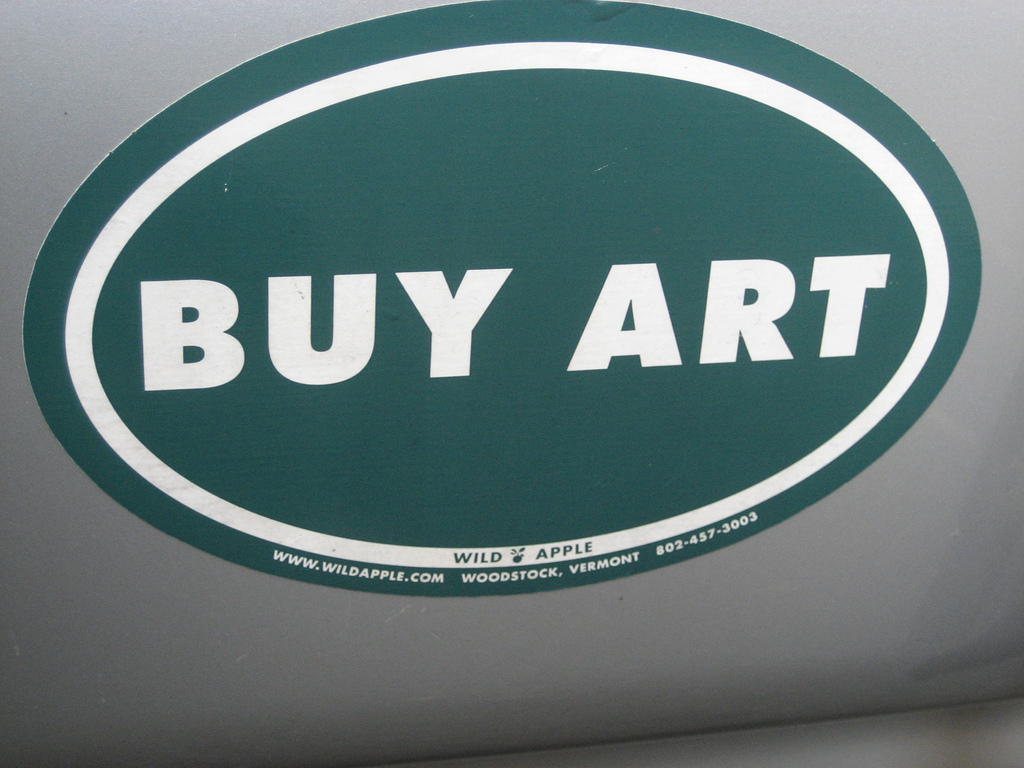I’ve been thinking a lot about frames for arts advocacy, and there’s one that I can’t stop thinking about. I wonder if you think it’s as useful and compelling as I do: sustainably produced art.
But first, some clarification. The terms can mean different things. Wikipedia, for instance, has an article about sustainable art that defines it as being art about general purpose sustainability. I’m talking about the means of artistic production themselves being sustainable. The Sustainable Arts Foundation is a lot closer to what I’m talking about. In their own words:
The Sustainable Arts Foundation is a non-profit foundation supporting artists and writers with families. Our mission is to provide financial awards to parents pursuing creative work.
Too often, creative impulses are set aside to meet the wonderful, but pressing, demands of raising a family. The foundation’s goal is to encourage parents to continue pursuing their creative passion, and to rekindle it in those who may have let it slide.
They’re trying to make it more economically viable for artists to make art by addressing a key targeted area: parenthood. (They’ve also recently decided to give half of their awards to artists of color, which is fantastic.) Their next deadline is September 2, 2016. if you’re eligible, go apply!
I want sustainability in the arts to be more than a funding strategy; I want it to be how we advocate for the arts. Alice Waters started putting the names of farmers on her menu, and the organic food revolution that followed was about health, but it was also about the environment, and fair pay for farmers. Now at the market we aren’t surprised to get a story along with our asparagus: the whole supply-chain of our food is something we expect to know more about. Hopefully, when we know more about where the food comes from, we’ll choose sustainable options even if they aren’t the cheapest.
American consumers used to “look for the union label“, now we look for organic food. But it’s all part of the same idea. The choices you make as a consumer have an impact that goes back to the source. When you don’t pay enough for a t-shirt or a strawberry, you’re encouraging others to mistreat workers, the environment, and your body.
The same applies to the arts – and the success of sustainability as an advocacy frame for food can help us advocate effectively for the arts. We just have to read their playbook.
There are a LOT of different stories about the internet and the arts – particularly about the internet and music. Some are good, some bad. But a common thread is how much more the consumer can know, and in some cases is expected to know, about how their media is made. You can learn a lot about the life of the artists you like these days.
Individually, we’ve been using that power to build our own audiences, our own communities. As a group, we can use it to show people whether or not the prices they pay for our work are high enough to provide us a living wage. And maybe, we can spread the truth: when you underpay for your art you’re encouraging the exploitation of artists.
I keep having conversations about how much an artist needs to live, and why Americans care so much about some things, and so little about artists. And I come back to transparency in the supply chain and consumer education as strategies to change the role of artists in society.
In sustainable agriculture so many issues intersect: human health, ecology, bioethics, labor practices, chemical regulation, international trade, and the whole cultural and aesthetic nature of food. Sustainable arts touches on a similarly wide range of issues, and can draw in people from a similarly wide range of perspectives: cultural economics, art history, labor economics, digital currency, IP regulation, the non-profit cultural sector, the for-profit entertainment sector, privacy activism, etc. etc. etc.
If you’re reading this you probably agree with me that artists deserve better treatment in our society. Do you find this idea of sustainable production (and borrowing the strategies of sustainable food to advocate) to be useful? Too complex to be helpful? Old hat? Or a compelling way to show people why they want to pay artists if they want the art they love to continue?
